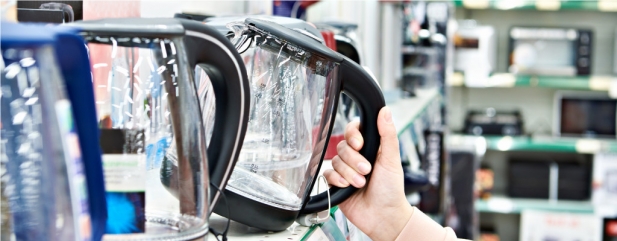Archived article
Please note that tax, investment, pension and ISA rules can change and the information and any views contained in this article may now be inaccurate.
The companies standing amid coronavirus headwinds

Few firms will be left unscathed from the knock-on economic effects of global actions to contain coronavirus, with recession almost assured over the next few months. The burden will certainly be felt most in the consumer facing sectors of the economy, but not all businesses will be affected to the same extent.
Two recurring themes that separate the following firms include a flexible operating structure, which embraces digital working practices and having products or services seeing demand independent of the state of the general economy.
BUILDING A HEAD OF STEAM
One surprising example because of where it operates is kettle safety controls company Strix (KETL:AIM). At its full-year results announcement (18 March) the company confirmed that the coronavirus impact was limited to its Guangzhou manufacturing plant, which is situated around 1,000 kilometres from Wuhan, the centre of the outbreak.
The plant was closed for just an extra week in line with Chinese government imposed policy, after the lunar New Year celebrations. Production resumed on 10 February and has since recovered close to full capacity, sufficient to meet customer demand.
International owner and operator of contracted power generating assets ContourGlobal (GLO) announced preliminary results on 17 March where it highlighted no material impact from coronavirus so far and, importantly it saw no impact for the rest of 2020.
The group has a distributed office strategy rather than a single headquarters and the company’s nine senior executives are based in five different cities.
The company has taken proactive measures related to power plant shifts, remote monitoring and operating technology and critical spares and inventory, to minimise operational risks. Each of the company’s power plants and offices are interconnected with video, audio and data.
LIMITED IMPACT FOR FOREX BROKER
Institutional foreign currency (FX) broker Alpha FX (AFX:AIM) provides risk management and payment solutions to corporations across 30 countries. The company has grown profit and revenue every year for the last decade, demonstrating demand for its services and the quality of its offering.
Annual results to 31 December showed revenues up 51% to £35.4m and operating profit up 47% to £14.7m, underlining momentum in the business. In regards to coronavirus the company says it is monitoring the credit quality of its clients and liquidity risk caused by increased market volatility carefully, but so far has seen limited impact.
In addition, because the company operates cloud technology it is well placed to operate remotely enabling the delivery of services to clients while also safeguarding the health of its employees.
TEAM PLAYER
Global games developer Team 17 (TM17:AIM) reported record gross profit up 49% to £29.5m on 10 March. With a strong back catalogue which generated 71% of 2019 revenues and a healthy pipeline of new games, the business seems in rude health.
Gaming analytics firm Newzoo estimates that the gaming market will grow at a compound average growth rate (CAGR) of 9%, reaching a market value of $196bn by 2022.
The short-term outlook is clouded by a more challenging economic outlook, and the possibility of big job losses and falling consumer expenditure. Also, the wider gaming industry has been impacted by many big expos being cancelled including the popular GDC and E3 events, and speculation the new PlayStation and Xbox may be delayed.
Mitigating these developments, many events have simply transformed into online-only or live Twitch streams, utilising the already established online gaming community and technology available.
Which FTSE 350 stocks have held up best?
It’s probably not surprising to see the shares of supermarkets, Ocado (OCDO), Sainsbury’s (SBRY) and Morrisons (MRW) performing better than the market, given the empty shelves and long queues that have become a common sight across the country.
According to government figures, Brits have forked-out an extra £1bn on stockpiling goods, such as pasta, rice and toilet rolls as panic set in over enforced home isolation. Ocado has temporarily stopped taking new customers as it struggles to keep-up with the demand surge.
On top of that, the government has introduced a business rates moratorium which for example could save Sainsbury the equivalent of close to a year’s profits.
Insurers Admiral (ADM) and Hastings (HAST) should benefit from fewer motoring claims as people work from home and use their cars less for commuting. There is normally a strong relationship between miles driven and the number of accidents on the roads.
Admiral reported a record pre-tax profit of £526m on 5 March for the year ended 31 December 2019 and described the business as ‘going like a freight train’. The groups UK insurance unit was the main driver behind the strong increase in business.
Nurofen to Dettol maker Reckitt Benckiser (RB.) has seen analysts upgrade their earnings expectations as consumers increase their purchases of health and hygiene products.
The same thinking applies to Unilever (ULVR), whose staple product range includes soaps and cleaning materials, gives their revenue some protection relative to the cratering sales seen in other parts of the economy.
Important information:
These articles are provided by Shares magazine which is published by AJ Bell Media, a part of AJ Bell. Shares is not written by AJ Bell.
Shares is provided for your general information and use and is not a personal recommendation to invest. It is not intended to be relied upon by you in making or not making any investment decisions. The investments referred to in these articles will not be suitable for all investors. If in doubt please seek appropriate independent financial advice.
Investors acting on the information in these articles do so at their own risk and AJ Bell Media and its staff do not accept liability for losses suffered by investors as a result of their investment decisions.

 magazine
magazine










